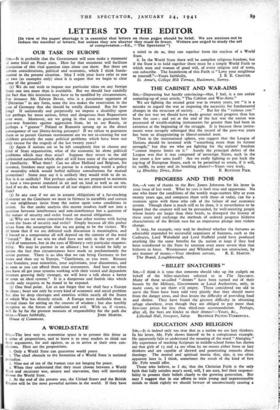LETTERS TO THE EDITOR
[In view of the paper shortage it is essential that letters on these pages should be brief. We are anxious not to reduce the number of letters, but unless they are shorter they must be fewer. Writers are urged to study the art of compression.—Ed., "The Spectator "1
OUR TASK IN EUROPE
sm,--It is probable that the Government will soon make a statement of some kind on Peace aims. How far that statement will facilitate discussion of this vital question time alone can show. But there are ..ertain considerations, political and economic, which I think funda- mental in the present situation. May I with your leave refer to one 3r two (as examples only) since it is urgent that we begin to clear ,ome of the ground?
(t) We do not wish to impose our particular ideas on any foreign State one iota more than is avoidable. But we should face candidly the fact that this intention may have to be modified by circumstances. For instance Mr. Edwyn Bevan, who is a passionate opponent of "Dictation" in any form, none the less makes the reservation in the case of Germany that she should be totally disarmed. But for how long? If unilaterally and perpetually we impose a disability upon her perhaps far more serious, bitter and dangerous than Reparations ever were. Moreover, are we going in that case to guarantee her post-war frontiers against aggression from, let us say Russia, or perhaps a " greater " Poland or Rumania sprung up as the direct consequence of our liberty-loving precepts? If we refuse to guarantee them or to permit German rearmament are we not re-creating for our children precisely the same political problems which have been our only excuse for the tragedy of the last twenty years?
(z) Again if nations are to be left completely free to choose any kind of State organisation, what of the economic let alone political problems which may thus arise? Suppose they revert to the old unfettered nationalism which after all will have some of the advantages of familiarity. What then? Can we allow Holland and Belgium, for instance, freedom once again to pursue in a rearming world a policy of neutrality which would forbid military consultations for mutual protection? Some may say it is unlikely they would wish to do so. But is it so unlikely? Not perhaps unless we are prepared to maintain at least a two-power standard in air and on land as well as on sea. And if we do, what will become of all our slogans about social security then?
(3) In any case if we are to assume obligations of a far-reaching character on the Continent we must in fairness to oursels and certain of our neighbours insist from the outset upon some conditions in return. So that under analysis this matter resolves itself not into a question between interference and non-interference but a question of the nature of security and order based on mutual obligations.
(4) Why are we more concerned then than other nations with laying down the bases of security and order? Simply because all this pother arises from the assumption that we are going to be the victors. We all know that if we are defeated such discussion is meaningless, and if forced to a compromise all will depend on the content of the word
forced." But if we win we shall have not only in the eyes of the world of tomorrow, but in the eyes of History a very particular responsi- bility. We may be partner in an alliance ; but it would be folly to ignore the fact that circumstances have made us predominantly the senior partner. There is au idea that we can bring Germany to her knees and then say to Europe, " Gentlemen, as you were. Resume your frontiers, your minorities, your aspirations, your discontents, and as soon as you can afford them your armaments. And later on when you have all got your systems working with their vested and dependent interests growing daily stronger, we will have a talk about a better or even an ideal system." It is a dangerous and foolish idea which surely only requires to be stated to be exposed.
(5) One final point. Let us not forget that we shall face a Europe in chaos ; beset not only by every kind of economic and social problem but also by deep cleavages and enmities within nearly all the States at which War has directly struck. A Europe more malleable than in normal times for setting on the courses of wisdom ; but also terribly receptive to the forces of confusion and evil. With us, if victors, will lie by far the greatest measure of responsibility for the path she






























 Previous page
Previous page